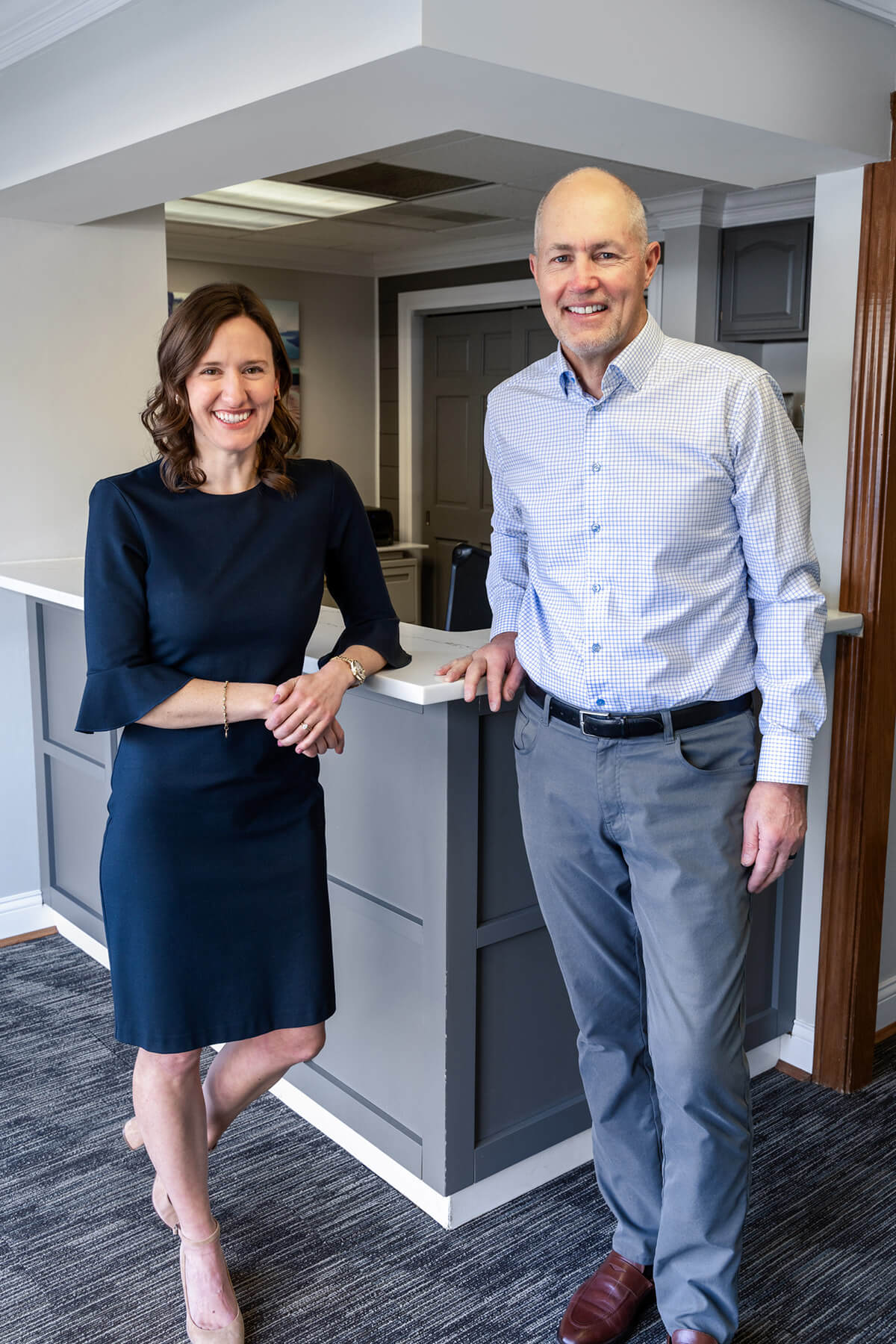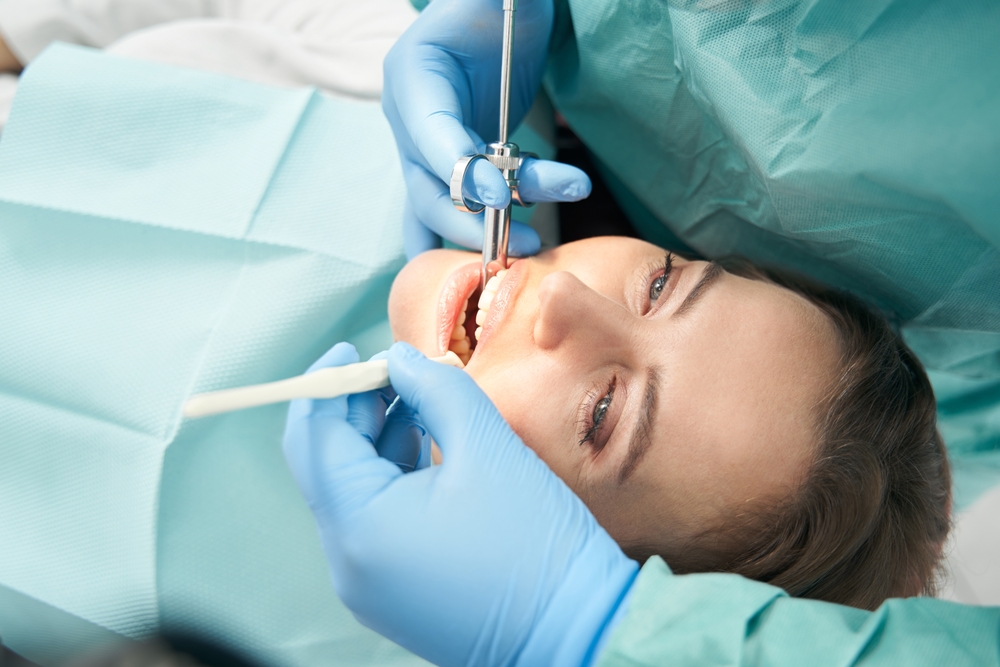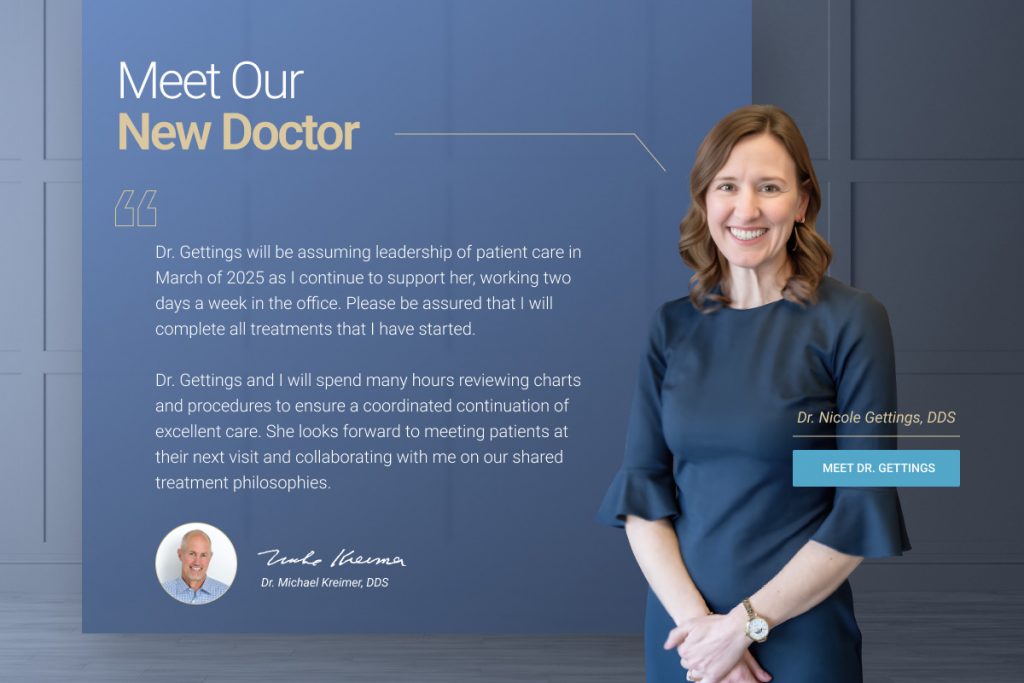Advanced Periodontal Care at Michael Kreimer, DDS
When years of plaque and tartar buildup compromise your oral health, a typical dental cleaning may not be enough. At Michael Kreimer, DDS in Loveland, OH, we provide specialized gross debridement cleanings that address severe calculus deposits and prevent further tooth decay. This intensive procedure prepares your mouth for comprehensive treatment while preventing serious complications like tooth loss and periodontal disease.
Ready to address your oral health challenges? Contact Michael Kreimer, DDS, at (513) 677-3656 to schedule your gross debridement consultation. Our Loveland dental practice welcomes patients from Mason, Montgomery, Lebanon, and throughout Cincinnati for comprehensive periodontal care.
Trusted Dentist in Loveland, OH
Discover why Michael Kreimer DDS Family and Implant Dentistry is the trusted choice for oral health in Loveland, OH, and surrounding Cincinnati communities like Mason and Montgomery. With over 30 years of dedicated experience, Dr. Michael Kreimer, a Cincinnati native and Ohio State University graduate, leads a team committed to exceptional care. Our practice emphasizes building lasting relationships, ensuring every visit feels personalized and welcoming, making us the preferred dentist in Loveland, OH, for families and individuals alike.
What truly sets us apart is our focus on patient empowerment through clear communication and a non-rushed environment, allowing you to feel confident in your oral health journey. Residents from Lebanon and beyond choose us for our reliable expertise and compassionate approach—visit our Loveland dental office today and experience the difference a trusted team can make.
Gross Debridement: When Standard Cleaning Isn’t Enough
What is gross debridement? Gross debridement is an intensive dental cleaning procedure that removes extensive plaque and tartar buildup from teeth and gums when standard cleaning methods are insufficient. This specialized treatment clears heavy calculus deposits that prevent proper oral health evaluation and sets the foundation for successful periodontal therapy.
The Science Behind Gross Debridement
Heavy tartar deposits create an environment where harmful bacteria thrive, leading to progressive gum disease and bone loss. Standard scaling instruments cannot effectively remove these extensive deposits, making specialized debridement necessary. The procedure uses ultrasonic technology and advanced hand instruments to break down calcified plaque that has accumulated over months or years of neglect.
Professional debridement addresses inflammation at its source, allowing your gums to heal while preventing the systemic health complications associated with periodontal disease. Research shows that untreated gum disease increases risks for heart disease, diabetes complications, and stroke, making debridement a vital investment in your overall wellness.

Who Needs Gross Debridement Cleaning?
Understanding whether you’re a candidate for gross debridement helps you recognize the importance of immediate professional intervention.
Primary Candidates for Treatment
- Patients with Long-Term Dental Neglect: Individuals who haven’t received professional care in years often develop extensive calculus deposits requiring specialized removal techniques.
- Heavy Smokers and Tobacco Users: Tobacco use accelerates plaque formation and reduces healing capacity, creating conditions that necessitate intensive debridement procedures.
- Individuals with Medical Conditions: Diabetes, autoimmune disorders, and certain medications increase periodontal disease risk, often requiring debridement as part of comprehensive management.
- Patients with Visible Tartar Buildup: Brown or yellow deposits along the gum line that resist removal through regular brushing indicate the need for professional debridement.
- Those Experiencing Severe Gum Symptoms: Persistent bleeding, swelling, bad breath, or loose teeth, suggest advanced periodontal issues requiring immediate intervention.
- Candidates for Periodontal Surgery: Before surgical intervention, debridement often provides less invasive treatment options that may eliminate the need for more aggressive procedures.
Gross Debridement Cleaning Procedure
Our systematic approach delivers thorough results while maintaining your comfort throughout the procedure.
- Detailed Oral Health Assessment: Dr. Kreimer or Dr. Gettings conducts a comprehensive examination, including digital X-rays to identify hidden calculus and evaluate bone levels affected by periodontal disease.
- Anesthesia Administration: Local anesthetic numbs treatment areas, allowing comfortable removal of deposits below the gum line where sensitivity typically occurs.
- Ultrasonic Scaling: High-frequency vibrations break apart large calculus deposits while irrigation flushes away debris and bacteria from periodontal pockets.
- Hand Instrumentation: Specialized curettes and scalers remove stubborn tartar that ultrasonic instruments cannot eliminate, particularly in root surface irregularities.
- Root Surface Smoothing: Careful planing creates smooth root surfaces that discourage bacterial reattachment while promoting healthy gum reattachment.
- Antimicrobial Irrigation: Therapeutic rinses reduce bacterial levels in treated areas, supporting healing and preventing immediate reinfection.
- Post-Treatment Evaluation: Complete assessment reveals previously hidden decay or periodontal damage, allowing development of comprehensive treatment plans.
- Home Care Instructions: Detailed guidance on post-procedure care supports healing while establishing habits that prevent future calculus formation.

Types of Debridement Procedures We Offer
Different clinical situations require specific debridement approaches for optimal results.
Full-Mouth Gross Debridement
This comprehensive approach addresses severe buildup throughout the entire mouth in one or two appointments. Patients with extensive neglect benefit from complete calculus removal that allows accurate diagnosis of underlying conditions. The procedure typically requires 90-120 minutes per appointment, depending on the severity of deposits.
Quadrant Debridement
Some patients benefit from dividing treatment into four sections, addressing one quadrant per appointment. This approach works well for patients with medical conditions requiring shorter appointments or those with severe gag reflexes. Insurance coverage often favors this method, spreading costs across multiple treatment dates.
Emergency Debridement
Acute periodontal conditions sometimes require immediate debridement to control pain and infection. These procedures focus on areas causing immediate problems while preparing patients for comprehensive treatment. Emergency debridement provides rapid relief while preventing complications.
Pre-Surgical Debridement
Before periodontal surgery, debridement removes surface deposits that could interfere with surgical procedures. This preparation improves surgical outcomes while reducing infection risks. Many surgical cases benefit from initial debridement that may eliminate the need for invasive procedures.
Benefits of Professional Gross Debridement
Investing in gross debridement cleaning provides immediate relief and long-term health advantages that extend throughout your body.
- Dramatic Improvement in Gum Health: Professional removal of bacterial deposits allows inflamed tissues to heal, reducing bleeding, swelling, and discomfort within days of treatment.
- Prevention of Tooth Loss: By eliminating calculus that destroys supporting bone and tissue, debridement often saves teeth that might otherwise require extraction due to advanced periodontal disease.
- Enhanced Daily Oral Hygiene: Smooth, clean tooth surfaces allow effective brushing and flossing, making your home care routine more successful in maintaining oral health between professional appointments.
- Elimination of Persistent Bad Breath: Removing bacterial deposits that cause halitosis provides immediate confidence in social and professional situations, improving quality of life significantly.
- Reduced Systemic Health Risks: Controlling oral bacteria decreases inflammation markers associated with heart disease, diabetes complications, and other serious medical conditions affecting overall wellness.
- Foundation for Successful Treatment: Clean tooth surfaces allow accurate diagnosis of decay and gum disease while improving the success rates of subsequent dental procedures.
- Cost-Effective Intervention: Early debridement often prevents the need for expensive periodontal surgery, tooth replacement, or treatment of medical complications associated with untreated gum disease.
Post-Debridement Care for Optimal Healing
Immediate Post-Treatment Guidelines
- Gentle Oral Hygiene: Use a soft-bristled toothbrush with fluoride toothpaste, avoiding aggressive scrubbing that could irritate healing tissues.
- Careful Flossing Technique: Begin gentle flossing 24 hours after treatment, using waxed floss to prevent trauma to sensitive gum areas.
- Antimicrobial Rinse Usage: Prescription or over-the-counter antibacterial mouthwashes reduce harmful bacteria while supporting tissue healing.
- Dietary Modifications: Avoid hard, crunchy, or spicy foods for 48-72 hours to prevent irritation and promote comfortable healing.
- Pain Management: Over-the-counter anti-inflammatory medications control discomfort while reducing tissue swelling during the initial healing phase.
Long-Term Success Strategies
Maintaining debridement results requires commitment to improved oral hygiene and regular professional care. Schedule follow-up cleanings every three to four months initially, progressing to standard 6-month intervals as gum health improves. Stay hydrated to support saliva production, which naturally cleanses the mouth and neutralizes harmful acids. Limit sugary snacks and beverages that feed oral bacteria, focusing on nutritious foods that support immune function and tissue healing.
Don’t let severe plaque buildup compromise your health and confidence. Contact Michael Kreimer, DDS, at (513) 677-3656 today to schedule your gross debridement consultation. Our experienced team provides compassionate care for patients throughout Loveland, Mason, Montgomery, and Lebanon.
Cost and Insurance Coverage Information
Treatment Cost Factors
Gross debridement costs typically range from $200-$800, depending on several variables. The extent of calculus buildup directly affects treatment time and complexity, influencing final fees. Geographic location plays a role, with urban practices often charging more than rural facilities. The dentist’s experience and the technology used also impact pricing, though advanced techniques often provide superior results that justify higher costs.
Insurance Coverage Options
Most dental insurance plans provide coverage for gross debridement under periodontal or preventive care categories. Coverage percentages vary from 50-100%, depending on your specific plan benefits. Some insurers require pre-authorization for debridement procedures, so we handle all necessary paperwork to maximize your benefits. Patients without insurance can explore CareCredit financing options or our in-house payment plans to make treatment affordable.


Frequently Asked Questions
How long does the gross debridement procedure take to complete?
Treatment duration varies based on the extent of calculus buildup and the number of areas requiring attention. Single-appointment full-mouth debridement typically takes 90-120 minutes, while quadrant-by-quadrant treatment involves four 45-60 minute appointments scheduled over several weeks. Patients with moderate buildup may complete treatment in 60-90 minutes, while severe cases occasionally require two comprehensive appointments.
Will I need gross debridement again in the future?
Gross debridement is typically a one-time procedure for most patients who maintain proper oral hygiene and regular professional cleanings afterward. However, individuals with risk factors like diabetes, smoking habits, or genetic predisposition to periodontal disease may require periodic debridement. Patients who return to poor oral hygiene or skip regular appointments may need additional debridement years later.
Can gross debridement save my teeth if they’re already loose?
Debridement can often stabilize loose teeth by removing the bacterial deposits causing bone and tissue destruction around tooth roots. Early-stage mobility frequently improves as inflammation reduces and tissues heal following thorough cleaning.
However, teeth with severe bone loss may require additional periodontal therapy or eventual extraction despite debridement efforts. Dr. Kreimer and Dr. Gettings evaluate each tooth individually, providing realistic expectations about treatment outcomes during your consultation appointment.
What’s the difference between gross debridement and regular dental cleanings?
Standard cleanings maintain oral health, while debridement restores health in patients with significant neglect or periodontal disease. Regular prophylaxis cleanings address light plaque and tartar above the gum line in patients with healthy mouths, typically taking 30-45 minutes every six months.
Gross debridement targets heavy calculus deposits both above and below the gum line that prevent proper oral health evaluation, requiring specialized instruments and extended appointment times. Following debridement, most patients transition to regular cleaning schedules for ongoing maintenance.
Maintain Optimal Oral Health With Preventive Dentistry Near You
Severe plaque and tartar buildup represent more than just a cosmetic concern – it threatens your teeth, gums, and overall health. Gross debridement cleaning offers a powerful solution that addresses years of neglect while setting the foundation for long-term oral wellness. At Michael Kreimer, DDS, our experienced team understands the challenges you face and provides compassionate care without judgment.
Contact our Loveland dentists at (513) 677-3656 today to schedule your gross debridement consultation. Don’t let another day pass without taking action – your oral health affects your entire quality of life. We proudly serve patients from Mason, Montgomery, Lebanon, and throughout the Cincinnati area with the comprehensive periodontal care that transforms lives. Take the first step toward better oral health today.


